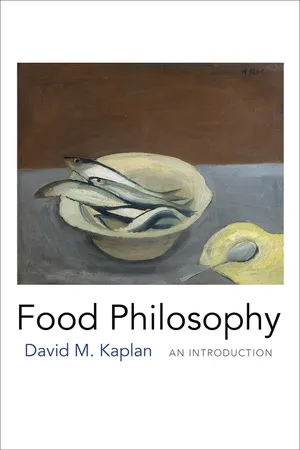
- English
- ePUB (mobile friendly)
- Available on iOS & Android
About this book
Food is a challenging subject. There is little consensus about how and what we should produce and consume. It is not even clear what food is or whether people have similar experiences of it. On one hand, food is recognized as a basic need, if not a basic right. On the other hand, it is hard to generalize about it given the wide range of practices and cuisines, and the even wider range of tastes.
This book is an introduction to the philosophical dimensions of food. David M. Kaplan examines the nature and meaning of food, how we experience it, the social role it plays, its moral and political dimensions, and how we judge it to be delicious or awful. He shows how the different branches of philosophy contribute to a broader understanding of food: what food is (metaphysics), how we experience food (epistemology), what taste in food is (aesthetics), how we should make and eat food (ethics), how governments should regulate food (political philosophy), and why food matters to us (existentialism). Kaplan embarks on a series of philosophical investigations, considering topics such as culinary identity and authenticity, tasting and food criticism, appetite and disgust, meat eating and techno-foods, and consumerism and conformity. He emphasizes how different narratives help us navigate the complex world of food and reminds us we all have responsibilities to ourselves, to others, and to animals. An original treatment of a timely subject, Food Philosophy is suitable for undergraduates while making a significant contribution to scholarly debates.
Frequently asked questions
- Essential is ideal for learners and professionals who enjoy exploring a wide range of subjects. Access the Essential Library with 800,000+ trusted titles and best-sellers across business, personal growth, and the humanities. Includes unlimited reading time and Standard Read Aloud voice.
- Complete: Perfect for advanced learners and researchers needing full, unrestricted access. Unlock 1.4M+ books across hundreds of subjects, including academic and specialized titles. The Complete Plan also includes advanced features like Premium Read Aloud and Research Assistant.
Please note we cannot support devices running on iOS 13 and Android 7 or earlier. Learn more about using the app.
Information
Table of contents
- Cover
- Title Page
- Copyright
- Dedication
- Contents
- Introduction. What Is Philosophy of Food?
- One. Food Metaphysics
- Two. Food Epistemology
- Three. Food Aesthetics
- Four. Food Ethics
- Five. Food Political Philosophy
- Six. Food Existentialism
- Notes
- Bibliography
- Index